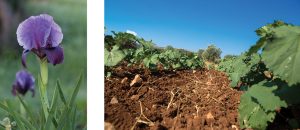By Bassam Almohor
Trail: Faqu’a Iris (Prickly Pear) Trail (circular)
Grade: Easy
Surface: Dirt road and part paved
Marked: Partially
Distance and duration: 2.5 km/1.5 mile; 2 hours
Elevation change: 79m ascent / 68m descent
Start coordinates: 32.49361111, 35.40194444
Faqu’a is a village famous for its iris, Palestine’s national flower. The village is located in the northern tip of the Israeli-occupied West Bank, 10 km east of Jenin city, surrounded by a well-cleaned and surveyed fence that marks the border of the 1967 occupation. A different scene in this part of the shrinking country. You come here to enjoy the walk, the scenery, the quiet and beauty of nature, and especially the rare purple iris that grows only in this part of the world. But you find the fence in your face, wherever you look, it hits you sharply to remind you that you’re not welcome, that your life and movement are limited, and that if you trespass into the nearby beautiful woods of Gilboa, you’ll be stopped, arrested, or shot.
The circular trail is beautiful. You walk among the edible prickly pears, a remarkably delicious sweet fruit that ripens in July and August. The village is famous for its prickly pear cactus that farmers now plant to mark their plots of land and to sell its fruits. A clean profit with not a single penny needed to care for it. It grows by itself, completely organic, no fertilizers, no water, no pesticides; a totally resilient plant.
In spring, it’s the iris trail. Walking groups visit Faqu’a from all around the country to admire the rare lilac beauty. But the iris (iris haynei) is short-lived. It only blooms in March and April. On the other hand, the prickly pear is an evergreen plant, with beautiful yellow flowers that bloom in June. Yet, picking the fruits is no easy job since they’re covered with very fine prickles. Farmers use a special tool to pick them, dew-covered, at dawn.
Carob is another evergreen tree that grows on the trail. During the summer, it provides an “air-conditioned” cool shade for its guests. Its sweet pods start to develop from green broad beans but then turn into a dark, glossy brown when ripe in August.
The climate in Faqu’a is semi-arid, with an average summer temperature of 32°. Faqu’a lies at the western edge of the Jordan Valley at an altitude of 432 meters above sea level. Its land is composed of hard, flinty limestone and terra rosa.
Animals are rare in this part of Palestine. The shrinking space, the separation fence, and the increasing number of humans are all factors that have driven away the animals. If you’re lucky and patient, you might find porcupines, foxes, some badgers, and wild boars.
Article photos courtesy of Bassam Al-Mohor.
For more information or to request a guide, contact Mofeed Jalghoum at mofeedjal@gmail.com or 059 977 2836.
Bassam Almohor can be reached at almohor@gmail.com, 0597534681, or on Facebook, @palestinestreetlife.
It is worth mentioning that the project of maintaining Faqoua Iris has started in 2018 through the Palestine Wild Life Society, PWLS in coordination with the local council of Faqoua supported by the Global Environment Facility’s Small Grants Programme GEF/SGP, UNDP and the Environment Quality Authority, EQA.




